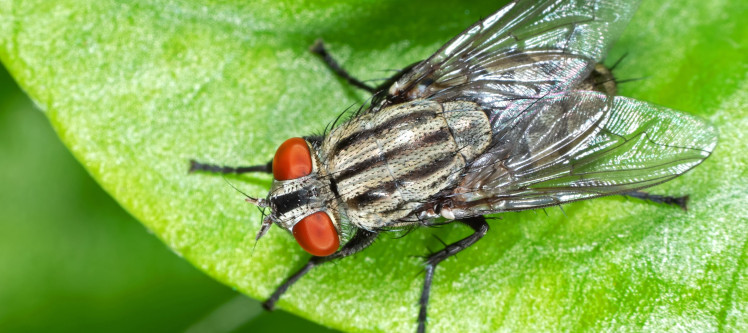
Are Flies Bad for Chickens?
If you own backyard chickens, you've definitely seen it. You walk toward the coop and the ground suddenly starts buzzing—you have a fly problem. Flies can be a nuisance to us but they can also be a danger to your chickens, so it’s important to know how to repel them and keep more from popping up.
Key Points on Fly Control
- Houseflies Are Dangerous: When chickens eat houseflies or their larvae, they can contract tapeworms or botulism.
- Cleanliness is the Best Prevention: The most important step is keeping the coop area clean, dry, and well-ventilated.
- Not All Flies Are Bad: Black Soldier Flies are beneficial, do not carry diseases, and their larvae are a nutritious treat for your flock.
-
The Problem with Houseflies
While some flies (like the Black Soldier Fly) are beneficial, the common housefly is more than just a nuisance—it's a direct threat to your flock's health. Chickens will naturally eat flies and their larvae, but this can introduce serious health problems.
Health Risks from Houseflies
- Tapeworms: Eating houseflies can infect chickens with the tapeworm Choanotaenia infundibulum, which starves them of vital nutrients.
- Botulism: Eating the larvae of the green bottlefly can cause botulism, a serious illness in chickens.
Because of these risks, it's always better to err on the side of caution and actively work to keep houseflies away from your coop and flock.
 The common housefly can transmit diseases to your flock.
The common housefly can transmit diseases to your flock.
-
How to Keep Flies Away
Considering that flies like dirty, wet things and chickens are professionals at creating them, keeping flies away can feel like an uphill battle. However, a combination of good hygiene and targeted solutions can make a big difference.
Prevention Through Cleanliness
Changing litter regularly, keeping the coop area clean, and providing proper ventilation are the most important steps. This will also contribute to your flock’s overall health and hygiene.
Natural Solutions
- Mix food-grade diatomaceous earth in with fresh bedding and litter. Flies that come in contact with it will dehydrate and die.
- Certain plants can efficiently repel flies. Lavender, rosemary, and mint are safe and beneficial for chickens.
Warning: Always do your research before planting any fly-repelling herbs around your chickens. Some plants, like tansy, will repel flies but can also harm your chickens if consumed.Insecticides
There are different kinds of insecticides you can use. The safest option that doesn’t risk contaminating feed or water would be fly traps and strips. These can be hung near the coop in a place the chickens can’t get to. Other methods include sprays and larvicides, which should always be used with care and never be sprayed on birds or close to their feed and water.
-
A Beneficial Alternative: Black Soldier Flies
While houseflies pose a risk, Black Soldier Flies are a welcome exception. They are completely safe for your flock and a fantastic addition to a backyard ecosystem.
Benefits of Black Soldier Flies
- Safe for Chickens: They don’t carry diseases or sting.
- Highly Nutritious Treat: The larvae and pupae are packed with protein, which can help prevent feather loss and increase egg production.
- Natural Enrichment: Chickens love hunting for the larvae, which fights boredom.
- Composting Powerhouses: They are excellent for composting, helping to manage waste.
 Black Soldier Flies are a safe and nutritious food source.
Black Soldier Flies are a safe and nutritious food source.


